- Home
- Jane Smiley
A Thousand Acres (1992 Pulitzer Prize) Page 14
A Thousand Acres (1992 Pulitzer Prize) Read online
Page 14
At any rate, I had rented the Rug Doctor from the Supervalu in Cabot, and by dinnertime I had worked up a dripping sweat, in spite of the new air conditioner. The shades were drawn, and the whirring sound of the machine was like a den I could curl up in, safe from my father's vagaries, Caroline's furies, and Rose's vigilance. And I was not immune to the accruing virtue of the clean, richly colored swathes in front of the cleaning head. It was like combining a field, except what you left behind seemed deeper and more fertile than before, rather than the other way around. I cleaned without a break, and when I turned off the machine, I had worked myself into a rather floating state of mind, abuzz with white noise, effort, and sweat. I stood up, stretched my back in both directions, and pushed through the door into the kitchen, carrying the reservoir of dirty water. Jess Clark was standing in the middle of the floor, smiling at me. I started, and water sloshed. He said, "So, want to go for a walk?"
"How long have you been here?"
"About a minute. I called fifteen minutes ago, but you must not have heard the phone. You want to go for a walk?"
"I'm exhausted, and I'm hungry, too. You do appear suddenly.
I've noticed that about you.
"You're just oblivious. I've noticed that about you.
That irritated me. I said, "Oh." I pushed out the back door and d the dirty water across to the hog pens. When I came back in, ess was still there. I said, "I'm busy and it's hot, too. Maybe some other time."
"Half an hour. I need someone to talk to."
I caught sight of myself in a window. Hair everywhere, black smudges on my cheek and chin. The irritation I'd voiced floated away under the influence of the buzz and the virtue. He said, "Anyway, I saw Ty in Pike at the implement dealer's. They were having a promotional barbecue, sponsored by John Deere. There were a lot of guys there, and he said to tell you not to bother with dinner.
That's what I was supposed to tell you when I called you fifteen minutes ago."
"Rose is doing Daddy's dinner."
"There you have it."
"People don't go for walks in the noon sun.
"I know a shady place."
"You must be kidding." I smoothed my hair and splashed water on my face. It was potent, him telling me that he needed someone to talk to, implying that he hadn't gone first to Rose.
He did know a shady spot, as it turned out. It was the little dump at the back of the farm, in a cleft behind a wild rose thicket, that we used and Harold used for refuse. The "shade trees" were an assortment of aspens and honey locusts, the latter of which sported thick, needlelike thorns four or live inches long, armoring the trunk from the ground up. The dump was a place I didn't go often, especially since we had started paying a monthly fee to use the landfill north of Pike.
When I saw where we were going, I slowed down, but Jess pulled me forward. He said, "Don't you love the dump? I spent whole days out here when I was a kid. This is the third time I've been here since I got back. It's still the most interesting spot on the farm."
"You're kidding."
"It's fun, I promise. I'll show you all the native plants I've identified. And some of the roses are still blooming, too. They smell out of this world."
The larger furniture of the dump consisted of a rusted-out automobile chassis, some steel drums, an old iron bedstead, a rusted-out truck bed with a broken-backed vinyl automobile seat in it, a roll of dark reddish brown barbed wire, and a cracked white ceramic toilet tank.
Supposedly, we were the only people who had ever used it for refuse, but I didn't recognize everything there. In the country, trash has a way of attracting other trash. Once Rose found an old hall rack, oak and, after we cleaned it, brass. She sold it for forty dollars to an antique store in Cabot, which inspired us to comb the dump two or three times for other profitable castoffs, but we hadn't found anything. I said, "I always wonder if other people sneak in here and throw things down the gully. I don't recognize anything here."
"I might recognize that automobile seat. It makes me think of Harold's old '62 Plymouth Valiant. Remember when he got that?
First new car he ever bought."
"I do remember that. It had a blue stripe along the side that angled upward at the un."
"That's it."
"Well, he only stopped driving it last year."
Jess, who was squatting and poking with a stick under the bedstead, looked up at me.
I laughed. "Gotcha. Really it's been ten years, anyway. I was just teasing you." He smiled.
I looked around. The rosebushes were nearly as high as my head and hid the dump from the view of my house, though you could see Harold's house and barn through the trees. On the lower branches of the rosebushes, simple white flowers spread their live petals like the open palm of a tiny hand. I knelt and sniffed. The fragrance was perfumy and strong.
Jess said, "Do you ever come out here and gather the hips in the fall?
They're probably as big as cherries."
"I heard you could do that."
"Good natural source of vitamin C. Or you could make rose petal jam. I love the fragrance of that."
"What are you poking at?"
"Snake."
"What?"
"Snake. Not a rattlesnake or anything. I think it's an eastern hognose, even though this area is sort of out of their range. I saw one last time I was here. They're funny snakes." He stood up. "No luck."
"How are they funny?"
"Well, they have hoods, like cobras, and if they can't chase you off any other way, they roll over and play dead, right down to the lolling tongue."
I laughed.
"They're one of my favorites."
"I never thought of having favorite snakes."
"Oh, there're lots of nice snakes around here. Milk snakes are beautiful, and racers. Rat snakes will climb up into corncribs and trees."
"Daddy's killed those."
"I'm sure."
"Daddy's not much for untamed nature. You know, he's deathly afraid of wasps and hornets. It's a real phobia with him. He goes all white and his face starts twitching."
"Huh."
Through the metal grid of the bedstead, some thin stalks of grass were growing. I broke one off and put it between my teeth. Jess did likewise, and said, "Big bluestem. When the pioneers got here, that was seven feet high."
"When the pioneers got here, this was all under water."
"Well, I know that. I was speaking generally." He grinned at me.
"Trying to evoke the romance of it all. Anyway, there's a bit of prairie here, now that it's dried out. Here's some switchgrass, too, and there's timothy all along the edge of the gully. Know what these are?"
I bent down and lingered the white petals. "The flowers look like pea flowers, but they're on stalks."
"Prairie indigo. Poisonous, too."
"What are those?"
Now it was Jess's turn to look closely at some short, purple-pink flowers. He said, "I know these."
"Well?"
"Locoweed?"
"Yup."
"And you were making out like you didn't know nothin'."
"I know shooting stars and wild carrots, and of course, bindweed and Johnson grass and shatter cane and all that other noxious vegetation that farmers have to kill kill kill. Haven't you seen Ty's trophies?
Giant cockleburs and world-class velvetleaf?" Now I was grinning, too, though the brightness of our grinning didn't seem exactly appropriate to the conversation. I had the strong sense that we had stumbled into a kind of daring privacy, and that the secluded nature of the spot where we were standing allowed it but did not create it. It was as venturesome to be out here, poking around in this dump, as it would be to head off to Minneapolis together, knowing you couldn't return until the next morning. It was also, oddly enough, terrifying. But our gazes were fixed on each other's faces, and we were unable to keep ourselves from testing the fix by moving, turning, bending down. The fix held, until I climbed into the truck bed, sat down in the filthy car seat,
and looked over the roses to the green roof peak of my house.
I was breathing hard and trembling.
I felt very afraid, but the fear also seemed unusually distant. I inhaled deeply. Jess went back to poking with his stick. I could hear a rhythmic tchocking punctuate the soughing of the breeze. The breeze in Zebulon County is eternal, and life there is marked by those times when you notice it. I noticed it. I noticed that there was a nest in the honey locust tree, too, but the birds were gone, and the nest was possibly an old one. From off in the distance, just under the sound of the breeze, came the zip of a tractor starting up.
Jess said, "Who's your father's favorite child?"
I turned and looked at him. He was squinting at me, hands on hips.
His lithe ligure curved against the line of aspens. I said, "It's always been Caroline, I'm sure."
"Why do you think that?"
"You mean especially now that he's cut her off?"
"Well, that. But why before, too? I mean, what is there about her that makes her favorite material?"
"Well, she's the youngest. Probably the prettiest. The most successful." This was not something I wanted to talk about.
"Maybe that's a result of being the favorite."
I put my chin in my hand, let my gaze rest on the old bedstead and thought for a minute. "She was never afraid of him. When she wanted something from him, she just stalked right up to him and asked him for it. He appreciated that, especially after me and Rose.
I was terribly afraid of him as a child, and Rose would stand up to him if she had to, but mostly stayed out of his way. With Caroline, it was like she didn't know there was something to be afraid of.
Once, when she was about three, he lost his temper at her, and she just laughed like he was playing a game." I was sweating.
"Do you care that Caroline is the favorite?"
"Hasn't done her any good lately, has it?"
"No." He smiled again. "But really."
"Do you really care about that after you're grown? I don't think about it, I guess." I smiled the way you do when you want someone to stop probing a subject, but you don't want him to know that. I spoke idly.
"Who's Harold's favorite?"
"Me."
"Even now?"
"Even now.
"But he and Loren are like twins. They see eye to eye about everything."
"Oh, I don't know. Every time Loren makes a suggestion, or even does something that he's used to doing on his own, like deciding where to spray or cultivate, Harold accuses him of trying to take over. It gets worse and worse. Loren has been back pedaling furiously. Now he's practically asking permission to wipe his ass, but in Harold's mind, there's this creeping plan, and Loren's manner is just a cover for his stealthy progress toward the deep dark goal. Two weeks ago, Harold was saying things like, 'Who said you should spray those beans?" Now it's, 'You aren't putting anything over on me! I know what you're up to."
"How weird."
"Well, it isn't so weird."
"Why not?"
"Well, for one thing, there's you guys." He broke off another stalk of big bluestem and began to stroke his palm with the tip. "I know you didn't initiate the transfer, and I think even Harold knows it, but people are getting suspicious and wondering how you and Rose got Larry to give you the place, when obviously the whole thing is driving him crazy.
"It was a complete surprise to us!"
"And very out of character for your dad, which is why people don't believe what appears on the surface."
I got out of the truck bed and stood myself right in front of Jess.
"What are people saying?"
"Just things like, 'There's more to that than meets the eye.
"Shit! But Harold was there! He was there the very moment Daddy told us what he wanted to do. It was at your party, and Harold laughed! I know he was thinking what a fool Daddy was being."
"Maybe so. At any rate, the talk will die down. It always does. I wouldn't worry about it. That's not Harold's real problem."
"What is?"
"That I'm here. He wants to keep me here, and I think he thinks the only thing he's got that would keep me here is the farm."
"Is that true?" My heart beat a little faster with this question.
Jess said, "The thing is, Harold can't understand being in a state of flux.
I mean, he understands uncertainty. Every farmer understands that, but it's something that comes from the outside, from the price of grain or the weather, not from within. If Harold's ever been restless, I'd be amazed." He turned away from me, tossed down the stem of grass, and picked up a few little stones, which he began tossing over the wild rosebushes. Finally he said, "The thing is, I can't decide if being like Loren is a disease that I'm too old to get now."
I laughed.
"No, seriously. When I went off to the army, there was no question about whether I would come back to the farm. I was good in 4-H and FFA. Remember that steer I raised? I took him to shows all over the state. Bob. Bob the Beef I used to call him. I liked him, I liked taking care of him, and I liked the money I made when he was slaughtered. I was the perfect future farmer, psychologically, I mean.
My care for old Bob was absolutely real, but it only went so far.
From the moment Harold told me he was mine, Bob was dead meat."
"What happened?"
"I changed my mind about meat, about the way meat is produced in this country, about what it does to your own body. I mean, I suppose Bob lived a good life. I showered him with attention. But he's the exception. He had a name. You know that the new hybrid breeds of chickens fatten so fast that they can't support themselves on their own legs? I mean, since they're all in cages after all, they don't really have to, and I suppose if their legs are bad, they don't want to get out, either. But it disgusts me. I don't want to eat it, I don't want to do it."
I went up to him and said, "But, Jess, you don't have to be a farmer, and if you are, you don't have to raise livestock. This seems kind of off the track to me. First you were talking about Harold, now you're talking about why you're a vegetarian."
He looked at me speculatively, rubbing his hand over his chin as if he had a beard. "Okay. Okay. The thing is, Harold loves me. He loves me like a lover. I've been gone so long that he's not used to me any more, and he wants to win me, and he thinks he can win me with the farm, even though he must know from things I've said that I wouldn't farm the way he does, I would use the land for other things. And I'm not sure that I want to be fixed, either. Harold wants to fix me right here in Zebulon County."
His voice sounded horrified. I said, "You sound like he wants to fix you the way Bob the Beef was fixed."
He laughed. "Well, maybe it would feel like the same thing. I don't know. But when I think of myself ten years down the road, I wonder if it'll be Loren and me, the Clark brothers, Frick and Frack, living in their concrete house, hunched over their plates, grunting and shoveling it in with a big spoon, three times a day."
"We're here."
"Yeah, you're there. You've made your families and your lives, and they're yours." He sounded as deeply, unself-consciously envious as I'd ever heard anyone sound. I felt struck, pierced. We didn't say anything more for a long, breezy moment. Finally, I said, "Anyway, how do you know Harold wants to give you the farm? Is he dangling it in front of you?"
"Hints. Just hints. After Pete said the other night that Harold had been talking about changing his will in the co-op, I started paying attention. Lots of hints."
"Well, wait till he does something concrete."
"That's what you all did, and look what happened."
"We were sort of caught with our pants down, weren't we?"
Jess laughed and I laughed and for a moment everything seemed remote and not very important. I wondered if maybe that wasn't the right way to look at things after all, standing in the dump, smelling the wild roses, and taking the long perspective.
Jess said, "I feel better. The more I talk abou
t it, the less important all of this seems. Something will come to pass. Thanks."

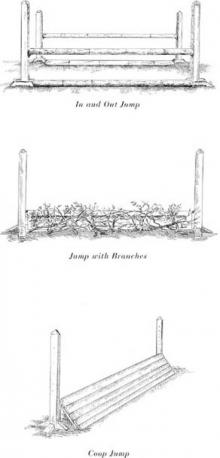 The Georges and the Jewels
The Georges and the Jewels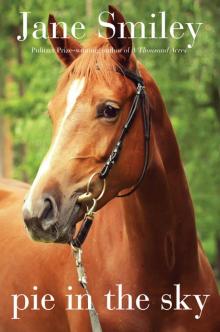 Pie in the Sky: Book Four of the Horses of Oak Valley Ranch
Pie in the Sky: Book Four of the Horses of Oak Valley Ranch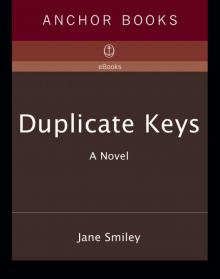 Duplicate Keys
Duplicate Keys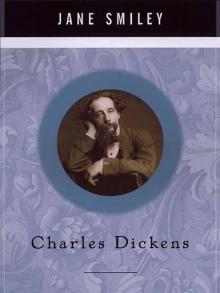 Charles Dickens
Charles Dickens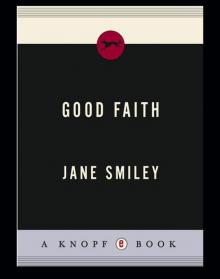 Good Faith
Good Faith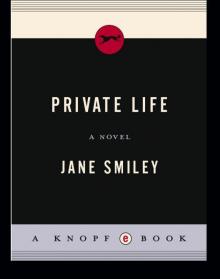 Private Life
Private Life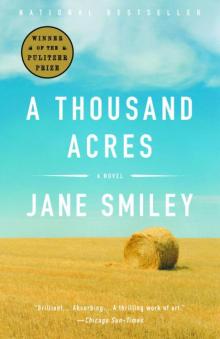 A Thousand Acres: A Novel
A Thousand Acres: A Novel The Greenlanders
The Greenlanders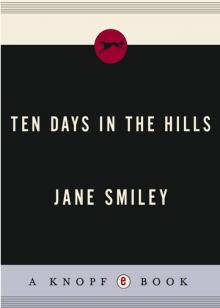 Ten Days in the Hills
Ten Days in the Hills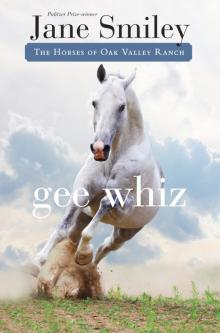 Gee Whiz: Book Five of the Horses of Oak Valley Ranch
Gee Whiz: Book Five of the Horses of Oak Valley Ranch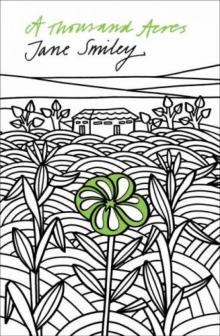 A Thousand Acres
A Thousand Acres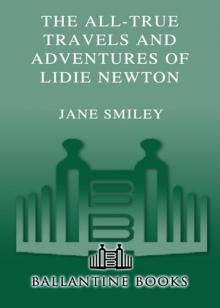 The All-True Travels and Adventures of Lidie Newton
The All-True Travels and Adventures of Lidie Newton Ordinary Love and Good Will
Ordinary Love and Good Will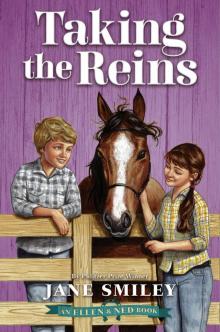 Taking the Reins (An Ellen & Ned Book)
Taking the Reins (An Ellen & Ned Book) The Man Who Invented the Computer
The Man Who Invented the Computer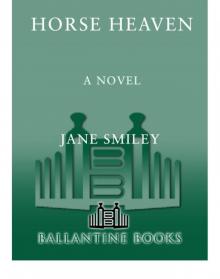 Horse Heaven
Horse Heaven The Age of Grief
The Age of Grief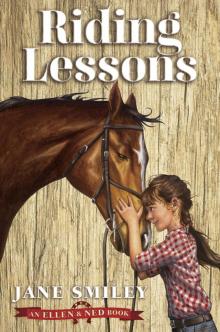 Riding Lessons
Riding Lessons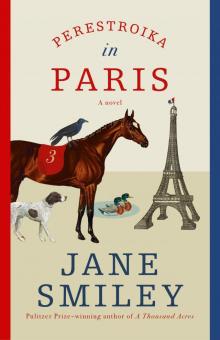 Perestroika in Paris
Perestroika in Paris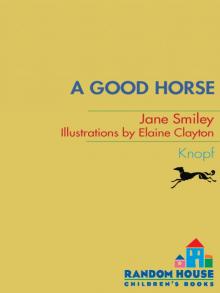 A Good Horse: Book Two of the Horses of Oak Valley Ranch
A Good Horse: Book Two of the Horses of Oak Valley Ranch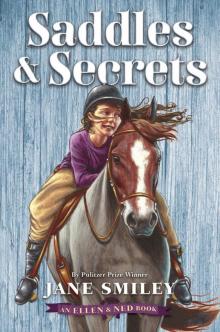 Saddles & Secrets (An Ellen & Ned Book)
Saddles & Secrets (An Ellen & Ned Book)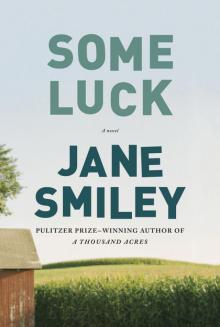 Some Luck: A Novel
Some Luck: A Novel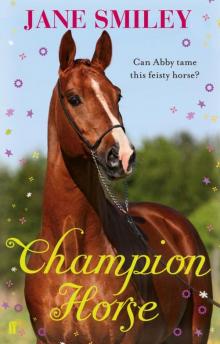 Champion Horse
Champion Horse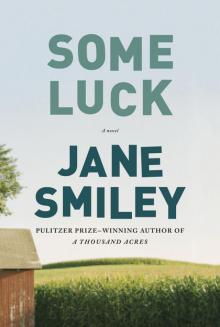 Some Luck
Some Luck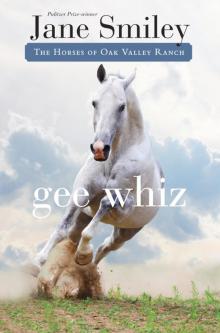 Gee Whiz
Gee Whiz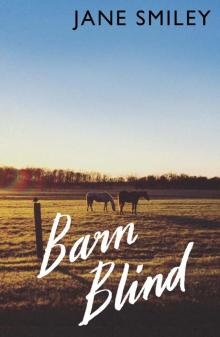 Barn Blind
Barn Blind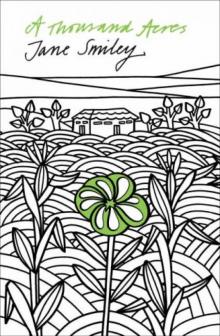 A Thousand Acres (1992 Pulitzer Prize)
A Thousand Acres (1992 Pulitzer Prize)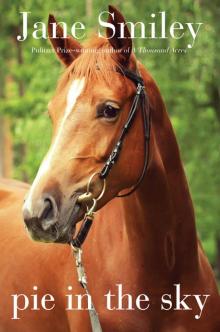 Pie in the Sky
Pie in the Sky True Blue
True Blue A Thousand Acres_A Novel
A Thousand Acres_A Novel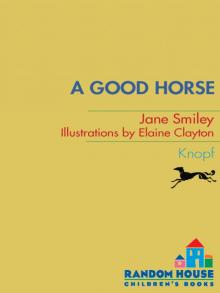 A Good Horse
A Good Horse